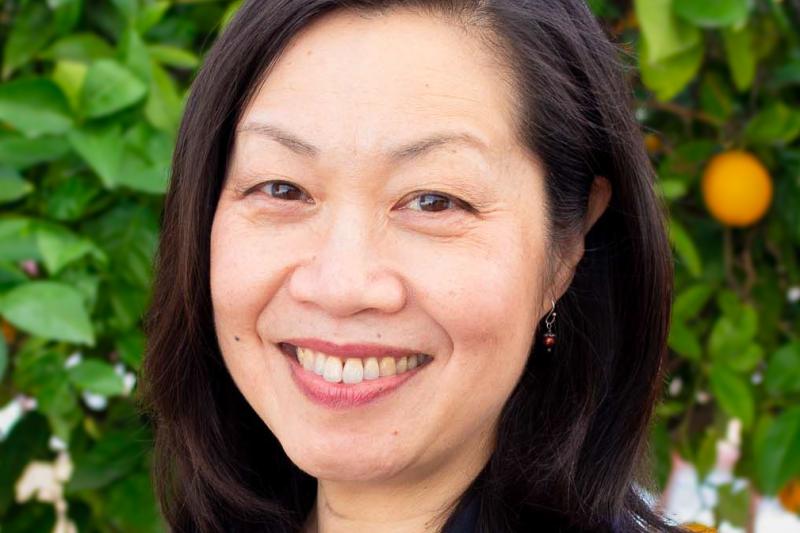
The enduring impact of the GSE
Jennifer Yee grew up in Compton, California, as the youngest of seven children to Chinese immigrant parents. Her mother, a kindergarten teacher, was a first-generation college graduate; her father was a mechanic. Now, nearly three decades later, Dr. Jennifer A. Yee credits her experience at the Stanford GSE -- with changing her life.
“I’m only one person. On my own, I can’t do as much. But as an educator, I can teach and mentor and build community. Empowering others with more love, peace, and justice is what can make a difference in our world. My impact is through my students.” Dr. Jennifer A. Yee, MA ’95
Jennifer Yee grew up in Compton, California, as the youngest of seven children to Chinese immigrant parents. Her mother, a kindergarten teacher, was a first-generation college graduate; her father was a mechanic. Now, nearly three decades later, she credits her experience at the Stanford GSE with changing her life. “As a child of immigrant parents," explains Jennifer, "I didn’t know the opportunities. I didn’t have the social and cultural capital to navigate grad school. As the first in my family to pursue an advanced degree, I was always questioning ‘Who’s going to take me?’”
Following the encouragement of faculty and student affairs mentors upon completion of her BA in journalism from California State University, Long Beach, Jennifer considered Stanford for graduate study among seven other prestigious programs nationwide.
“When I visited, the students and faculty were so welcoming and down-to-earth. I immediately fell in love with Stanford but was too embarrassed to say I didn’t have the funds. I had worked two jobs in college and asked if there was any work or scholarships I could apply for.”
Philanthropy paves the road to Stanford
When Jennifer had not yet claimed her admission spot in the GSE master’s program, the program advisor, former dean of students Jim Lyons, called and encouraged her to apply for financial opportunities. Thanks to the availability of fellowship funding made possible through philanthropic support, Jennifer could not only attend Stanford—she was equipped to flourish.
“My degree program at Stanford, coupled with my fellowship in the Asian American Activities Center (aka 'A3C,' pronounced A-cubed-C) was everything I wanted and more. My faculty and cohort of just 12 students taught me much about the dynamics between people, understanding your assumptions, and reflecting upon who you are. Through the A3C and Dean of Students’ office, I learned how activism and intentional community-building effects necessary structural change and a powerful sense of belonging. They oriented me into a flexible way of being and creative thinking that is so uniquely Stanford.”
A pivotal moment during Yee’s studies that would ultimately inform the future of her academic and career trajectory for the next three decades occurred in 1994 when California voters passed Proposition 187, a ballot initiative proposed by anti-immigrant organizations that restricted undocumented immigrants from public services, including access to public education and health care.
“It opened my eyes,” Jennifer explained. “Having grown up in Compton and having a mom who taught in Watts and Huntington Park, I had always advocated for African American and LatinX students. In this seminal moment, I also wondered: Who was advocating for the Asian American community? I considered the order that sent thousands of Japanese American citizens to internment camps during World War II an order coming from the highest level of government. How could this happen? Researching the question of how Japanese American students at Stanford were sent to the camps without public protest for my History of Higher Ed class was a lesson in how oppression occurs. It changed my life. I had always been raised to be proud of who I am, but at Stanford, I realized there was a lot I didn’t know and wanted to learn.”
A career dedicated to lifelong learning and teaching
Yee’s appetite for learning has endured. Since completing her MA in higher education administration at Stanford in 1995, Yee has amassed over 30 years of experience in higher education, from administrative roles in student affairs and academic affairs to teaching education and Asian American Studies at the University of California, Los Angeles, where she earned her MA/PhD in higher education and organizational change. She specializes in policy making, transformative pedagogy, critical service learning, community-engaged scholarship, critical Asian American and Pacific Islander feminist epistemology, mentoring, activism for social justice, and cancer survivorship. She loves teaching and partnering with students and university and community colleagues to build infrastructure for peace, health, and social justice. In 2023, Jennifer was selected as a reviewer for the American Council on Education’s 2024 Carnegie Elective Classification for Community Engagement Cycle.
Jennifer is currently professor of Asian American Studies at California State University, Fullerton, where she has been honored with the 2024 Asian American Pacific Islander Faculty and Staff Association Teaching or Research Award, the 2020 Humanities and Social Sciences Outstanding Teaching Award, the 2019 WoMen’s & Adult Re-Entry Center HER(d) Faculty Member of the Year Award, the 2018 Dean’s Research Award for Associate Professors, and the 2011 Outstanding Service-Learning Instructor Award, among many other accolades. In 2017, the Western Region of Campus Compact recognized her with its inaugural Community Engaged Scholar award for demonstrating deeply engaged, high-quality academic work, community collaboration for change, and institutional impact. The Orange County Asian & Pacific Islander Community Alliance presented Jennifer with its Community Hero Award for Dedication and Invaluable Service to Orange County in 2011, along with congressional recognition for her leadership, commitment, and outstanding service to the multiethnic communities of Orange County.
“Teaching in Asian American Studies is about community-building and empowerment. Transformation through pedagogy. How can I create learning experiences that change people’s lives? How can we benefit our communities to make a difference in our world? I learned to ask those questions at Stanford, which was about imagining what was possible.”
